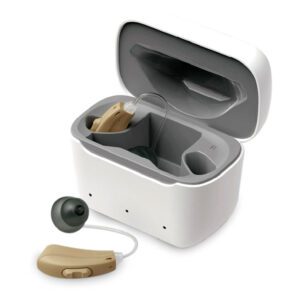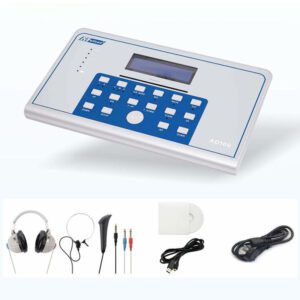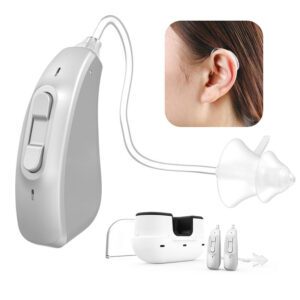
A hearing aid is a small electronic device that you wear in or behind your ear. It makes some sounds louder so that a person with Hearing Loss can listen, communicate, and participate more fully in daily activities. A hearing aid can help people hear more in both quiet and noisy situations. However, only about one out of five people who would benefit from a hearing aid actually uses one.
A hearing aid has three basic parts: a microphone, an amplifier, and a speaker. The hearing aid receives sound through a microphone, which converts the sound waves to electrical signals and sends them to an amplifier. The amplifier increases the power of the signals and then sends them to the ear through a speaker.
Hearing Aids are primarily useful in improving the hearing and speech comprehension of people who have Hearing Loss that results from damage to the small sensory cells in the inner ear, called hair cells. This type of hearing loss is called sensorineural hearing loss. The damage can occur as a result of disease, aging, or injury from noise or certain medicines.
A hearing aid magnifies sound vibrations entering the ear. Surviving hair cells detect the larger vibrations and convert them into neural signals that are passed along to the brain. The greater the damage to a person’s hair cells, the more severe the hearing loss, and the greater the hearing aid amplification needed to make up the difference. However, there are practical limits to the amount of amplification a hearing aid can provide. In addition, if the inner ear is too damaged, even large vibrations will not be converted into neural signals. In this situation, a hearing aid would be ineffective.
If you or an adult family member have questions or concerns about hearing loss, you have options. Over-the-counter (OTC) Hearing Aids are a new category of Hearing Aids that people can buy directly, without visiting a Hearing Health professional for an examination. These hearing aids are intended to help adults with perceived mild to moderate hearing loss. Prescription hearing aids are available from a hearing health professional who will program them for your degree of hearing loss. Prescription hearing aids or other devices may be necessary for more significant or complicated hearing loss.
Spieth’s latest H51 is an OTC hearing aid, the appearance is mini and exquisite, easy to carry, the core is “powerful”, and the maximum fitting range is over 80dB. And the price is very friendly. Contact us for more information.


